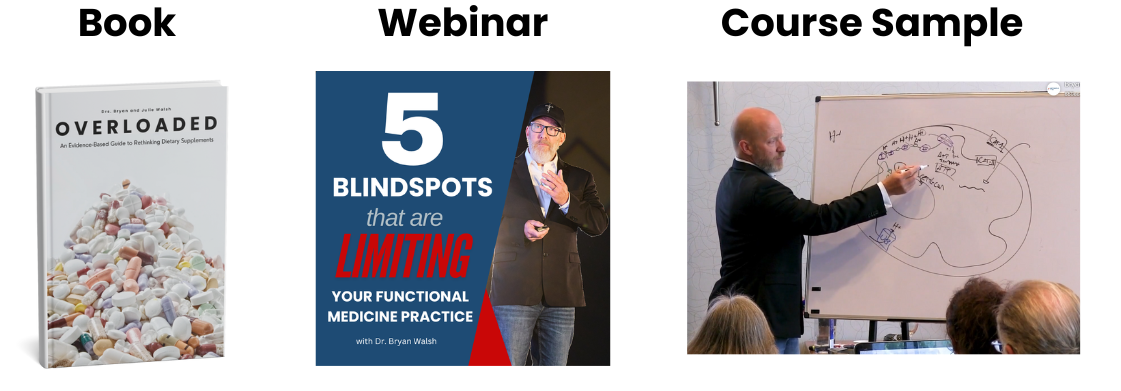You know, that little section on your intake form where you ask if someone gets “shaky, lightheaded, or irritable” between meals?
Reactive Hypoglycemia is generally to blame.
While it seems innocent enough, it contributes to bigger problems down the road like hormone imbalances, cognitive issues, mood disorders, oxidative stress, inflammation, and more.
How to Treat Reactive Hypoglycemia
When we ask practitioners what they do for these patients they say, (in almost a zombie-like fashion), “small, frequent meals” and then tack on a couple of their favorite supplements.
Is that you? Keep reading. Oh, and don’t feel bad if it is. That was us too, but now we know better and we want you to as well.
First, telling someone they must eat every two to three hours of their life, FOR THE REST OF THEIR LIFE is a recommendation that is destined to fail. Sure, carrying around a bag of almonds or a cheese stick sounds kind of fun at first. It may even bring back fond memories of snack time in kindergarten. But at the end of the day, if the person has kids, a job, or a busy life in any way, this is not realistic.
Second, while this high-maintenance meal plan may improve their symptoms, it does not correct the problem. Ahem…root cause, remember?
Causes of Reactive Hypoglycemia
Lastly, and likely the biggest reason you must stop doing this is: There are multiple causes of reactive hypoglycemia.
That’s right, if Karen and Susan both come to your office, telling you the same story of wanting to punch their husbands if they skip lunch, there is a good chance it’s for two very different reasons.
And therefore, needs different interventions. [bu-bye tried and true reactive hypoglycemia protocol from your favorite Functional Medicine guru]
Think we’re making this up?
That’s right, if Karen and Susan both come to your office, telling you the same story of wanting to punch their husbands if they skip lunch, there is a good chance it’s for two very different reasons.
And therefore, needs different interventions. [bu-bye tried and true reactive hypoglycemia protocol from your favorite Functional Medicine guru]
Think we’re making this up?
Reactive Hypoglycemia Case Review
Check out this case review of two people with the same exact reactive hypoglycemic symptoms.
Patient A is a 70-year-old woman. Patient B is a 52-year-old man. They both experience hypoglycemic symptoms following a meal.
A four-hour oral glucose tolerance test was performed on both patients, with both glucose and insulin being measured throughout the procedure.
Patient A had a fasting glucose of 83 mg/dL (4.6 mmol/L), which jumped up to 214 mg/dL (11.9 mmol/L) in 30 minutes, remained there for a while, and then came crashing down to 41 mg/dL (2.3 mmol/L) by the two-hour mark. Because she was feeling so awful, the clinicians gave her some glucose to stabilize her and called off the rest of the experiment.
Her insulin told an interesting story. Insulin shot up with glucose right away but then continued to rise after glucose plateaued, which is why her glucose ended up crashing so hard.
Patient B, on the other hand, had a fasting glucose of 105 mg/dL (5.8 mmol/L). His glucose topped out at a whopping 303 mg/dL (16.8 mmol/L) after an hour and ended up at 63 mg/dL (3.5 mmol/L) a couple of hours later, when he, too, developed hypoglycemic symptoms.
His insulin story is also interesting, as it did not start to increase until 30 minutes after he consumed the glucose drink. His insulin continued to increase, even after glucose was falling, which is likely what contributed to his eventual hypoglycemic symptoms.
Patient A is a 70-year-old woman. Patient B is a 52-year-old man. They both experience hypoglycemic symptoms following a meal.
A four-hour oral glucose tolerance test was performed on both patients, with both glucose and insulin being measured throughout the procedure.
Patient A had a fasting glucose of 83 mg/dL (4.6 mmol/L), which jumped up to 214 mg/dL (11.9 mmol/L) in 30 minutes, remained there for a while, and then came crashing down to 41 mg/dL (2.3 mmol/L) by the two-hour mark. Because she was feeling so awful, the clinicians gave her some glucose to stabilize her and called off the rest of the experiment.
Her insulin told an interesting story. Insulin shot up with glucose right away but then continued to rise after glucose plateaued, which is why her glucose ended up crashing so hard.
Patient B, on the other hand, had a fasting glucose of 105 mg/dL (5.8 mmol/L). His glucose topped out at a whopping 303 mg/dL (16.8 mmol/L) after an hour and ended up at 63 mg/dL (3.5 mmol/L) a couple of hours later, when he, too, developed hypoglycemic symptoms.
His insulin story is also interesting, as it did not start to increase until 30 minutes after he consumed the glucose drink. His insulin continued to increase, even after glucose was falling, which is likely what contributed to his eventual hypoglycemic symptoms.
While small, frequent meals may work for them symptomatically, it would in no way fix their underlying problem.
Understanding Reactive Hypoglycemia
Did you know there are a good half-dozen potential causes of post-prandial reactive hypoglycemia, few of which are adequately taught (or even mentioned) in the Functional Medicine space?
The narrative surrounding glucose regulation is far more intricate than what the industry typically presents.
This complexity is why we cover numerous facets of glucose regulation in Clinician's Code.
For instance, we delve into crucial yet frequently overlooked topics such as glucose variability, the necessity of including c-peptide in every lab panel (and its superiority over insulin), and innovative therapeutic approaches tailored to various patterns of glucose dysregulation. Start learning for free with our free guide below.
The narrative surrounding glucose regulation is far more intricate than what the industry typically presents.
This complexity is why we cover numerous facets of glucose regulation in Clinician's Code.
For instance, we delve into crucial yet frequently overlooked topics such as glucose variability, the necessity of including c-peptide in every lab panel (and its superiority over insulin), and innovative therapeutic approaches tailored to various patterns of glucose dysregulation. Start learning for free with our free guide below.
Top Three Nutritional Causes of Reactive Hypoglycemia
Take a sneak peek into this practice-changing information with our Free Guide to the Top Three Nutritional Causes of Reactive Hypoglycemia below and learn:


